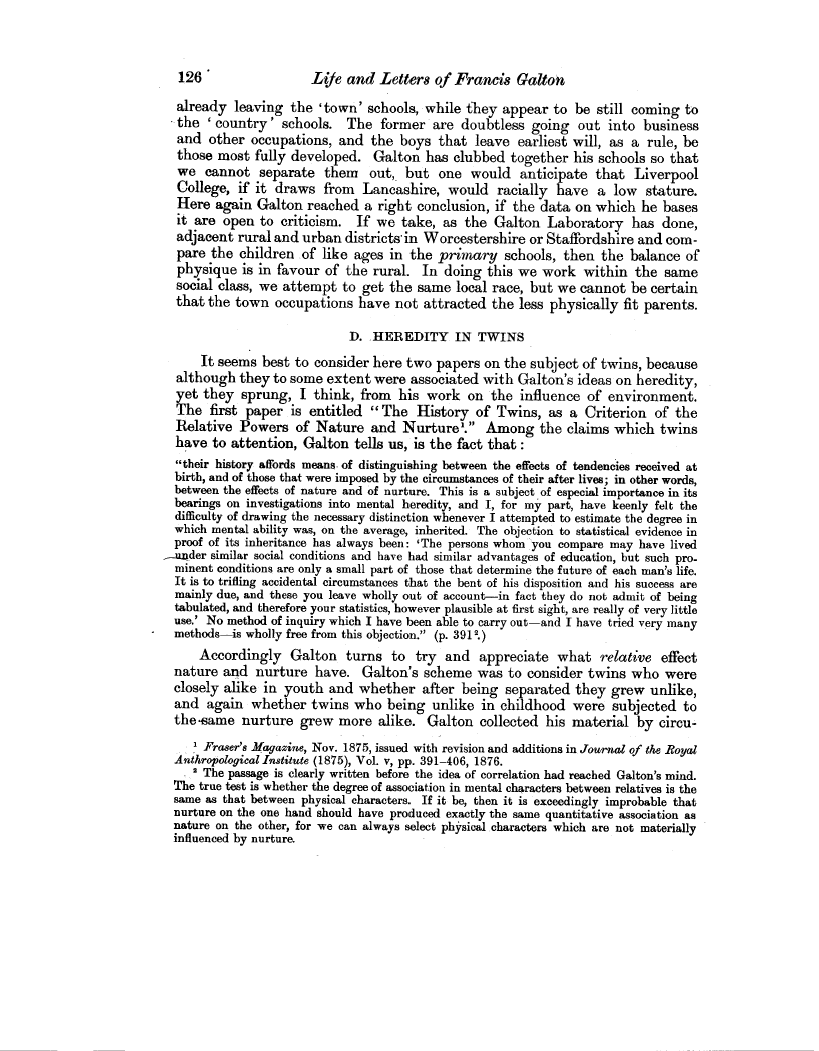126' Life and Letters of Francis Galton
already leaving the `town' schools, while they appear to be still coming to the `country' schools. The former are doubtless going out into business and other occupations, and the boys that leave earliest will, as a rule, be those most fully developed. Galton has clubbed together his schools so that we cannot separate them out,_ but one would anticipate that Liverpool College, if it draws from Lancashire, would racially have a low stature. Here again Galton reached a right conclusion, if the data on which he bases it are open to criticism. If we take, as the Galton Laboratory has done, adjacent rural and urban districts- in Worcestershire or Staffordshire and compare the children of like ages in the primary schools, then the balance of physique is in favour of the rural. In doing this we work within the same social class, we attempt to get the same local race, but we cannot be certain that the town occupations have not attracted the less physically fit parents.
D. -HEREDITY IN TWINS
It seems best to consider here two papers on the subject of twins, because although they to some extent were associated with Galton's ideas on heredity, yet they sprung, I think, from his work on the influence of environment. The first paper is entitled "The History of Twins, as a Criterion of the Relative Powers of Nature and Nurture'." Among the claims which twins have to attention, Galton tells us, is the fact that
"their history affords means of distinguishing between the effects of tendencies received at birth, and of those that were imposed by the circumstances of their after lives; in other words, between the effects of nature and of nurture. This is a subject. of especial importance in its
bearings on investigations into mental heredity, and I, for my part, have keenly felt the difficulty of drawing the necessary distinction whenever I attempted to estimate the degree in which mental ability was, on the average, inherited. The objection to statistical evidence in proof of its inheritance has always been: 'The persons whom you compare may have lived
--.upder similar social conditions and have had similar advantages of education, but such prominent conditions are only a small part of those that determine the future of each man's life. It is to trifling accidental circumstances that the bent of his disposition and his success are mainly due, and these you leave wholly out of account-in fact they do not admit of being tabulated, and therefore your statistics, however plausible at first sight, are really of very little use.' No method of inquiry which I have been able to carry out-and I have tried very many
methods-is wholly free from this objection." (p. 3912.)
Accordingly Galton turns to try and appreciate what relative effect nature and nurture have. Galton's scheme was to consider twins who were closely alike in youth and whether after being separated they grew unlike, and again whether twins who being unlike in childhood were subjected to the same nurture grew more alike. Galton collected his material by circu
i Fraser's Magazine, Nov. 1875, issued with revision and additions in Journal of the Royal Anthropological Institute (1875), Vol. v, pp. 391-406, 1876.
2 The passage is clearly written before the idea of correlation had reached Galton's mind. The true test is whether the degree of association in mental characters between relatives is the same as that between physical characters. If it be, then it is exceedingly improbable that nurture on the one hand should have produced exactly the same quantitative association as nature on the other, for we can always select physical characters which are not materially influenced by nurture.

